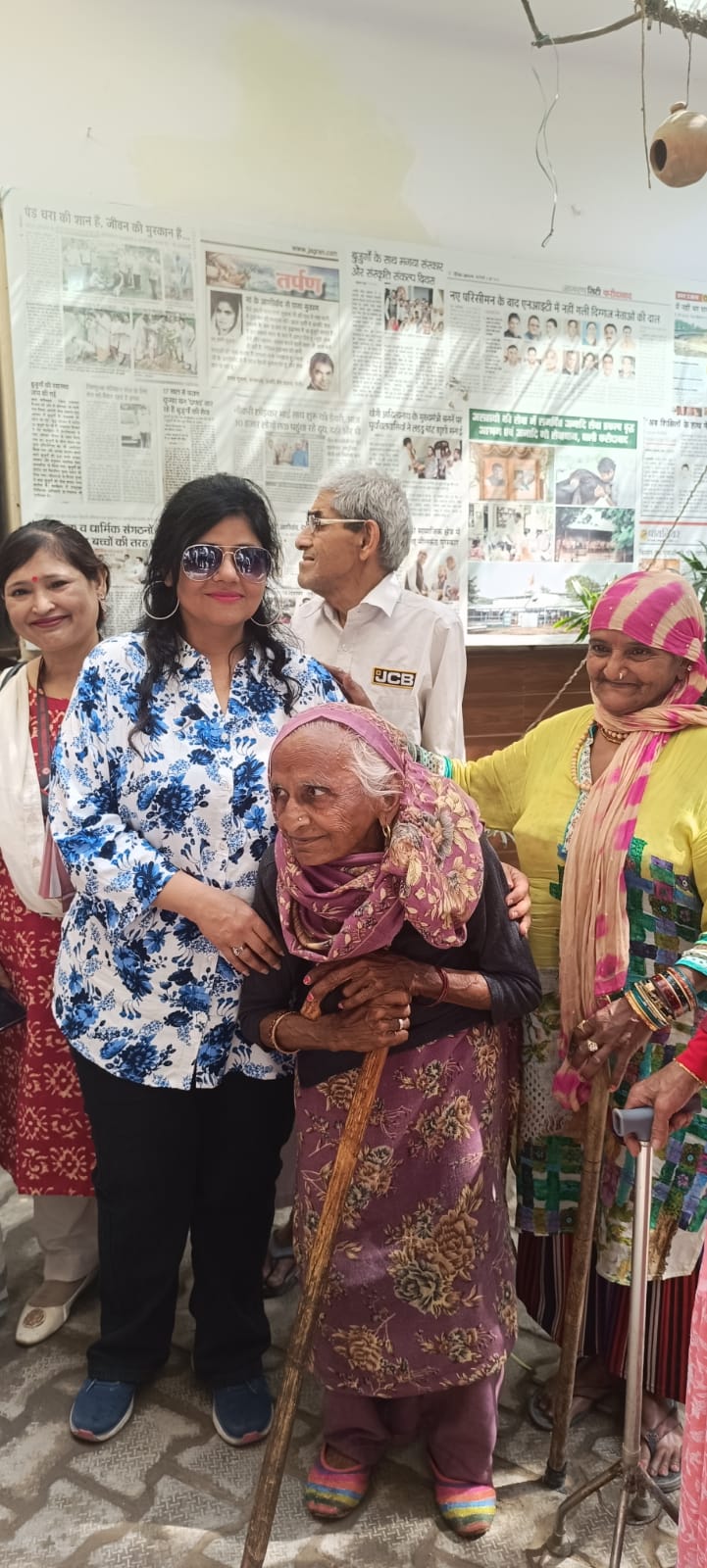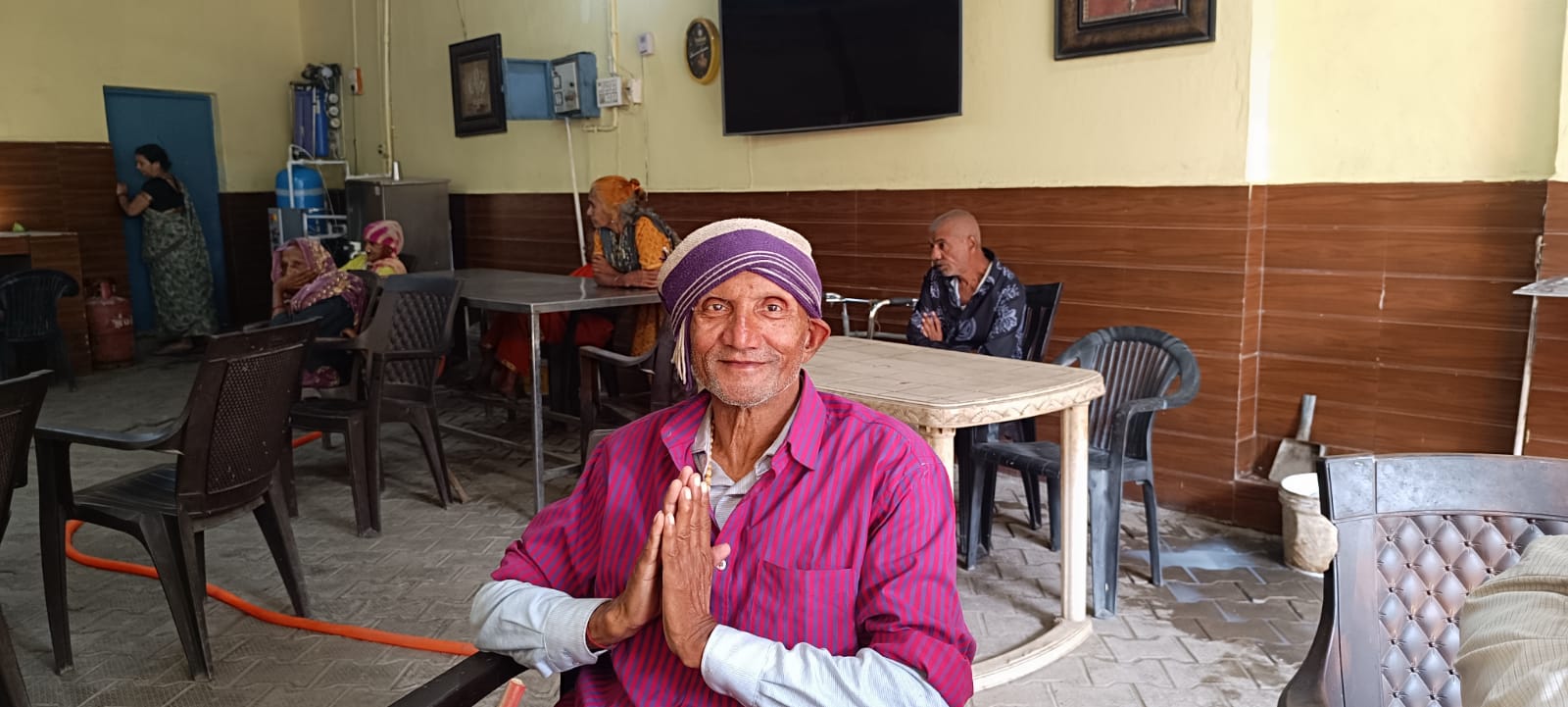


Umeed – a ray of hope – is an invisible force that allows every individual to persevere despite adversity, reminding them that challenges are temporary and even the darkest night will end. Hope is the energy that makes the world go round. It is what allows people to dream, to fight, and to believe in something greater than their present circumstances. As long as there is hope, there is the possibility of change, growth, and renewal.

“To live without hope is to cease to live.” — Fyodor Dostoyevsky Umeed is not just a word but a whole universe which finds its home in the heart of every Indian. In Indian tradition, ‘Umeed’ is often tied to celebrations, prayers and rituals where individuals seek blessings from their elders for prosperity and well-being. Thus, ‘Umeed’ beautifully captures the essence of endurance and positivity in Indian life. But now ?????..... With the tide of modernisation, it lies torn and forgotten in a corner, tittering on the edge, fading away. So, we — the ‘Uambassadors’ — have decided to restore this ‘umeed’ by revisiting our values and traditions and harnessing them from our home with a vision to contribute to our community. For the Team Umeed, it is the hope to be dedicated, to love and contribute selflessly, and to join hands for comprehensive change.

In the heart of India's rich cultural tapestry, our community is woven with love, respect, and care for our elderly. Our
community is laden with values that uphold upbringing in such a way that it is interlaced with reverence towards our
elders for their wisdom, guidance, and blessings. We learn to cherish their presence, honor their experiences, and show
gratitude for their love.
As we grow, this sense of responsibility and devotion only deepens. We're encouraged to spend quality time with our
elders, listen to their stories, share meals, and create memories that last a lifetime.
In our community, every elder is a treasure, a keeper of traditions, and a symbol of our heritage. We strive to create a
world where they feel valued, loved, and never forgotten.

The project ‘Umeed’ is driven by a simple yet powerful goal: to create an opportunity for youngsters to fulfil the hopes of our elders.
Thus, UMEED aims to be a one-stop platform for young individuals to connect with old age homes, visit the elderly, and engage them in meaningful activities. Rooted in the deep respect for elders that Indian traditions uphold, UMEED seeks to bridge the growing disconnect between generations and provide care, companionship, and engagement for senior citizens.
Extensive research, including visits to old age homes, has shed light on the challenges faced by the elderly,
particularly the loneliness that often surrounds them. To address this, a variety of activities have been designed to
keep them engaged while also enhancing their mental and physical well-being.
Beyond supporting senior citizens, Umeed is also working towards connecting orphanages with old age homes. Plans are underway to establish the NGO ‘Umeed’ that will bring both orphans and the elderly under one roof—creating a nurturing environment filled with love, care, and companionship for all. An application titled ‘Vintage Veterans’ has been developed to alleviate further concerns and provide more companionship to the elderly community. Hence, the project extends far and wide with a vision to fulfill the hopes our elders have placed in us.

The theme of the Umeed Project is ‘Hope’. As mentioned above, it is a hope to be better; to be our best selves. Companionship and compassion become our foremost actions to actualize this theme. Centered around connection, the initiative seeks to bring warmth, companionship, and emotional support to elderly residents in old age homes, reminding them that they are seen, valued, and never alone. By engaging in meaningful conversations, offering a listening ear, and sharing moments of joy, the project aims to uplift their spirits and bring a sense of hope and belonging into their lives.
Rooted in the belief that hope is timeless, the Umeed Project fosters intergenerational bonds, creating a space where wisdom is shared, stories are heard, and relationships are built.

“Our passion is to foster empathy in action” — is what inspired the team to unlock innovative avenues to foster true upliftment of spirit for everyone involved in this endeavour.

Yes, the internet has been incredibly helpful in research. With the vast amount of information available on the internet, the students had access to a wealth of data. This facilitated more efficient and effective research.

International CyberFair is an authentic learning program utilized by schools and youth organizations around the world
for students to help them in developing new skills and interests. The main research we did for this Cyber Fair project
was on the ‘create and unite’ theme and how we can create a platform to unite the generations.
Our project on unity was designed to align directly with international standards and required coursework by integrating
interdisciplinary research with hands-on, authentic learning. By exploring how technology can unite generations, we
applied core academic skills such as critical thinking, digital literacy, web development, research and analysis,
content creation, app building, collaborative problem-solving and report writing — key components in current STEM,
Social Studies, Moral Science, English and Communication curricula. This research not only supported required coursework
by connecting theoretical concepts with real-world applications, but it also fostered a broader understanding of global
citizenship and community engagement. Ultimately, our work met curriculum standards by encouraging students to use
innovative digital tools to bridge generational divides, reinforcing both academic and social-emotional learning
objectives.

To complete our CyberFair project, we employed a variety of information tools and technologies. Laptops served as our central hub for research, development, and content creation. Smartphones with good cameras were utilized to capture supporting visuals, while collar microphones ensured clear audio recordings. For web development, we relied on HTML, Bootstrap, jQuery, and JavaScript (JS) to build our website's structure, responsiveness, and interactive features. We also explored advanced technologies like WebGL for 3D graphics and Highcharts.js for dynamic data visualization. Photoshop and Canva were essential for creating and editing visual content. Throughout the project, we actively researched and experimented with various web development libraries and trends, discovering more efficient design and development methods. We explored content management strategies to ensure organized information presentation and prioritized responsive design and UI/UX to create an accessible and engaging user experience.

Throughout our project, our team worked tirelessly to create a website that celebrates the lives and experiences of the
elderly.
We are proud to call ourselves the ‘Uambassadors’ of Umeed. Throughout our project, our team worked tirelessly to create a platform where we could extend our support to those who traversed many challenging paths and lend an empathetic ear to their lost stories. As Uambassadors our mission extended beyond just research—we became the voice for elderly welfare, advocating for
their dignity, well-being, and social inclusion.
We actively engaged in both online and offline initiatives to amplify our cause. Our website serves as a comprehensive
platform, sharing stories, traditions, and challenges faced by the elderly, fostering empathy and awareness. To bridge
the gap between generations, we conducted field visits to two old age homes, interacting firsthand with the residents,
understanding their struggles, and documenting their wisdom.
Beyond digital efforts, we extended our outreach by launching Google Forms, enabling people to volunteer, donate, or
contribute in any capacity. Through word-of-mouth advocacy, social media promotions, and community discussions, we
encouraged more people to recognize the importance of elderly welfare and take action.

Students and teachers developed a deeper understanding of the struggles that elderly people face, including physical limitations, mental health challenges, loneliness, and societal neglect. This inspired them to be more compassionate and supportive in their interactions with older generations. After learning about the adversities of older people, not just team members but the local community developed a sense of social responsibility, realizing that they have a role to play in improving the lives of vulnerable populations. This translated into volunteer work, community service, and even an NGO proposal with an app design. By studying the challenges faced by older adults, students thought critically about societal structures, healthcare systems, and the values we place on different age groups. It encouraged a clearer understanding of how society functions and what can be improved.

Our project involved other members of our community as helpers and volunteers in various ways. Throughout our research on the elderly, we reached out to local communities, organizations, and individuals to gather insights and information. We collaborated with local senior centers, retirement communities, and healthcare organizations to gain a deeper understanding of the elderly and their way of life. Additionally, we conducted interviews with seniors and their caregivers, gathering valuable information and personal stories that enriched our project. Furthermore, we involved local students and volunteers in our project, providing them with opportunities to learn about the elderly and develop new skills. Overall, our project brought together members of our community from diverse backgrounds and age groups, fostering a sense of collaboration and social responsibility.

Our project with Umeed was a testament to the power of inspiration. We celebrated the lives of the elderly, learned valuable life skills, and gained a deeper understanding of our community's rich cultural heritage. Through meaningful conversations, we uncovered stories and experiences passed down through generations. However, we were also saddened by the harsh realities of abandonment and rejection. Many elderly individuals had been forced to leave their homes and families, only to be relegated to old-age homes. This poignant reminder highlighted the need for empathy, compassion, and understanding. Through this profound exploration of the human experience, we were reminded of the importance of intergenerational connection and the value of preserving our cultural heritage. Visiting an old age home brings unexpected emotions—hesitation turns to warmth as strangers become storytellers, sharing wisdom, laughter, and newfound friendships. A student may arrive thinking they’re there to help but leave realizing they’ve gained just as much. There’s joy in seeing elderly faces light up, a bittersweet awareness of their loneliness, and a newfound appreciation for human connection. One doesn’t leave the same person they were before.
